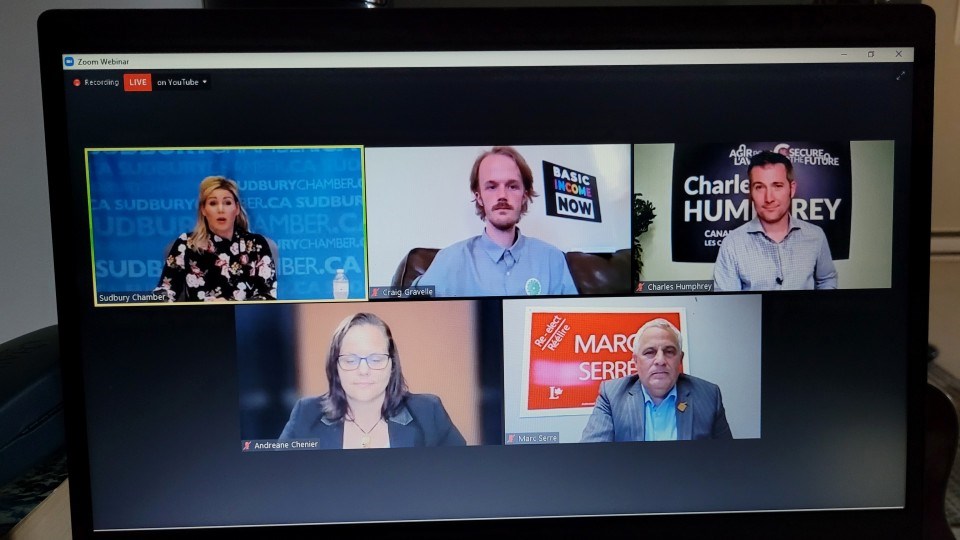The topic of pandemic-era economic relief and recovery was one of a handful of topics that dominated Wednesday night’s debate featuring Nickel Belt federal candidates.
The evening livestreamed event, called the “Virtual Fireside Chat with the Federal Candidates,” was hosted by the Greater Sudbury Chamber of Commerce and followed the previous night’s event with Sudbury candidates.
Depending on which candidate was speaking, Canada Emergency Response Benefit (CERB) monthly payments of $2,000, which have since been replaced by Canada Recovery Benefit (CRB) payments of $1,200, have been too little, too much or just right.
Put into motion by the incumbent Liberal government, it was only fitting that Liberal candidate Mark Serré was in the “just right” camp.
“As a federal government we feel we have no choice but to support individuals and support businesses through these difficult times,” he said, adding that taking on this financial burden at a time of low interest rates is something the economy can sustain.
Conservative candidate Charles Humphrey said it’s time to wind down these programs and shift support to help businesses rehire people rather than pay people “to not work.”
“We’re trying to wean the Canadian population that needed a measure of support throughout the pandemic when jobs were lost, and start encouraging people to get back to work,” he said.
The Conservatives would replace existing programs with a 25- to 50-per-cent wage assistance for businesses that hire people who have been laid off.
Humphrey’s word choice didn’t sit well with NDP candidate Andréane Chénier.
“When I hear the words ‘weaning people off,’ it really gives the connotation that people are lazy, when in fact it’s quite possible the jobs that they were looking for were no longer available to them because there was an unprecedented closing of a number of businesses,” she said.
Rather than pare down benefits as the Liberals have done, “before the pandemic recovery is complete,” she said the NDP would retain them until such time as everyone’s back to work.
“This idea that we can just drop everything and go back is a little premature in our estimation.”
Green candidate Craig Gravelle promoted a universal basic income as “a great policy that will help businesses.”
“I believe that debt and the inflation isn’t something that we should be worrying about — it’s not something that businesses should be worrying about,” he said.
Universal basic income is “a great policy for business,” he said. “There’s no better policy for business because businesses need customers with expandable cash, and that’s a big problem in Nickel Belt and across Canada.”
As for moving beyond the pandemic, Humphrey pointed to a Conservative plan called Secure the Future, which aims to secure jobs, accountability, mental health, the country and economy.
The plan includes the Rebuild Main Street Tax Credit, which would give a 25-per-cent tax credit on amounts of up to $100,000 that people personally invest in a small business.
“It is time to reverse the investment drain and the innovation drain which has sucked Canada’s economy dry,” Humphrey said.
Moving forward, Serré said affordable, $10 per day child care, which eight provinces and territories have signed onto, and which Ontario has yet to join, would offer an economic boost alongside an investment in infrastructure, which he described as “a good way to have good-paying jobs.”
The Liberal plan also includes billions of dollars invested in a green economy.
Chénier said the NDP’s approach forward includes “stimulating the economy and investing in infrastructure, investing in medicare, investing in pharmacare and housing,” thereby creating jobs.
They’d support businesses with economic relief benefits until they’re completely reopened and rerstaffed “in order to make sure that businesses are in a position to hire or rehire.”
Tyler Clarke covers city hall and political affairs for Sudbury.com.
